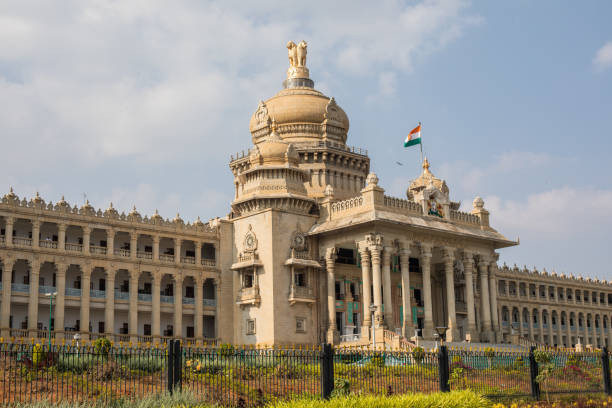


The Indian stock market took a nosedive on Thursday, with the BSE Sensex and NSE Nifty50 dropping over 1.50% each as tensions in the Middle East continue to escalate. The decline, which resulted in a loss of Rs 7 lakh crore in market capitalization, is attributed to a surge in crude oil prices and a notable outflow of Foreign Institutional Investor (FII) money from India to China. Experts warn that the situation may worsen if Israel retaliates against Iran, which could lead to a spike in crude oil prices and potentially harm economies like India. Investors are advised to closely monitor the situation and consider shifting their portfolios to defensive sectors, such as Pharma and FMCG.
Reliance Industries: A Market Heavyweight Under Pressure
Reliance Industries Limited (RIL), India's largest private sector company, has been a dominant force in the domestic stock market for decades. However, recent developments have cast uncertainty on its future performance.
Background:
RIL is a conglomerate with interests in petrochemicals, refining, retail, and telecommunications. It is led by India's richest man, Mukesh Ambani. The company has played a significant role in India's economic development and has a market capitalization of over Rs. 16 lakh crore.
Recent Challenges:
RIL has faced several headwinds in recent times, including:
Impact on Indian Stock Market:
RIL's challenges have had a negative impact on the broader Indian stock market. The company is one of the largest constituents of the benchmark Sensex and Nifty indices. Its decline has contributed to the recent market correction.
Top 5 FAQs and Answers:
1. Why is RIL's stock price falling? A: RIL's stock price is falling due to escalating crude oil prices, FII outflows, competition, and regulatory uncertainties.
2. How will the current crisis impact the Indian stock market? A: The decline in RIL shares has already had a negative impact on the broader Indian stock market. Further decline could lead to a deeper correction.
3. What should investors do? A: Investors should closely monitor the situation and consider shifting their portfolios to more defensive sectors, like Pharma and FMCG.
4. What is the long-term outlook for RIL? A: The long-term outlook for RIL remains uncertain. The company faces several challenges, but it is also a well-established conglomerate with a strong brand and a track record of innovation.
5. What are some other factors that could affect RIL's performance? A: Other factors that could affect RIL's performance include the health of the Indian economy, government policies, and the global economic outlook.

Traditional performance reviews often lack the necessary information and structure to be truly helpful. Lark Base, a project management tool, aims to change this by centralizing performance data into one source of truth. This not only allows for more accurate and comprehensive reviews, but also enables managers to track and improve client-facing projects and employee milestones. Additionally, Lark Messenger promotes a culture of constant feedback by making communication structured, easy to find, and tied to actionable items. With Lark Base and Messenger, performance reviews become more meaningful and effective for both employees and managers.

In a significant development for India's aviation industry, Hindustan Aeronautics Limited (HAL) has signed an MoU with Russia's PJSC-UAC to manufacture the SJ-100 aircraft domestically. This marks the country's first full passenger aircraft production in over three decades and is seen as a major step towards achieving self-reliance in the civil aviation sector. With an expected demand for over 200 jets in the coming years, this partnership is crucial for strengthening regional connectivity and boosting the domestic manufacturing economy.

The Union Cabinet has approved the Terms of Reference for the 8th Central Pay Commission, which will revise salaries and benefits for central government employees and pensioners. The commission is expected to submit its recommendations in 18 months, following extensive consultations with various stakeholders. The recommendations are expected to be implemented from January 1, 2026.

Swan Defence and Heavy Industries, in collaboration with MDL, is making significant investments and expanding capacities at India's largest shipyard in Pipavav Port. This strategic partnership not only reinforces #AatmanirbharBharat but also opens up opportunities for partnerships and tie-ups in the shipbuilding space. The recent signing of a MoU with Mazagon Dock Shipbuilders to design and construct Landing Platform Docks for the Indian Navy is a testimony to this.

Aviation Daily reports that Air China Cargo, a subsidiary of Air China, will soon be acquiring up to ten Airbus A350Fs as part of its efforts to expand its fleet and improve air transport services. The announcement was made by Chen Chuanren, a renowned aviation correspondent for the Aviation Week Network, who joined the team in 2017. This move by Air China Cargo highlights the growing demand for air transport services in the Asia-Pacific region and is expected to contribute to the company's continued growth and success.

Airbus has officially inaugurated its new final assembly line for the A320-family in Tianjin, marking its 10th production line globally. The line is expected to significantly increase production and help achieve Airbus' target of 75 A320-family jets per month by 2027. The advanced facility will feature the company's latest technologies and processes to ensure high-quality production of aircraft worldwide. Plans for the second line were initially announced in 2023 during a state visit by French prime minister Emmanuel Macron.

Tech billionaire Elon Musk has launched a new encyclopedia, Grokipedia, which aims to surpass Wikipedia's reach and accuracy through the use of AI fact-checking. However, the website has faced criticism for its biased and potentially inaccurate information, with many pointing out that it glorifies Musk and his views. Despite this, some believe that Grokipedia could revolutionize internet searches, thanks to Musk's dominance in the tech industry.

Satyam Rastogi, a renowned expert in the business world, has been serving as a bridge between Indian and overseas companies. His valuable insights and expertise have led to successful collaborations and partnerships between various organizations. With his vast experience and knowledge, Rastogi has become a sought-after resource person in both Indian and international settings.

OMC, a state-owned mining company, is leading the charge in promoting ethical practices and transparency among its employees. As part of the Vigilance Awareness Week, OMC's top officials, including the managing director, administered an integrity pledge to employees at their head office. Employees across OMC's regional offices and mines also participated in the pledge, reaffirming their commitment to honesty and accountability. To mark the occasion, a walkathon was held to raise awareness about the fight against corruption.

Bengaluru's Chief Minister Siddaramaiah recently honored Munawar Zama, CEO and Founder of English House Academy Pvt Ltd., with the prestigious 'Pride of India Award' for his exceptional work in motivating and empowering young people. Zama, who began his career as a pharmacist, has made a significant impact through his Residential Personality Development Workshops and mentoring initiatives, reaching over 3.5 lakh individuals. During the award ceremony, the Chief Minister and other influential leaders praised Zama for instilling values and inspiring purpose among today's youth.